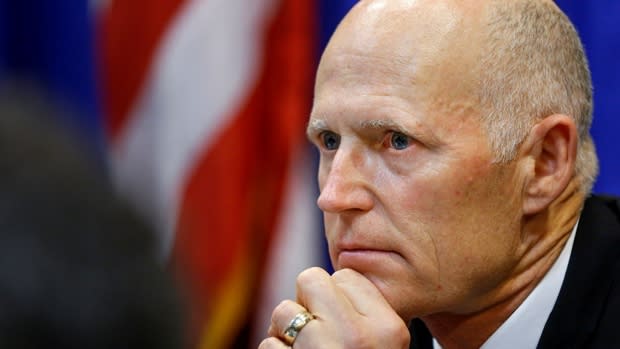Reckless rhetoric is the real threat to public faith in Florida recounts: Keith Boag
The vaunted framers of the U.S. Constitution never anticipated the kind of destructive debacle of a Senate race unfolding in Broward County, Fla., this week.
They had no reason to expect the haggling about undervotes and overvotes, the obtusely designed ballot, the accusations of bad faith and conflicts of interest, to say nothing of the interventions of President Donald Trump and his baseless Twitter hysteria about a stolen election.
That's because James Madison, Alexander Hamilton and the other framers didn't even prescribe a popularly elected Senate. They recoiled at the idea of sharing power with ordinary folk, fearing the hoi polloi would just screw things up (see The Federalist Papers #10). So the constitution they produced directed state legislatures to choose their own U.S. senators.
Statewide popular elections for the U.S. Senate are relatively modern and didn't fully evolve until after the 17th Amendment was passed in 1913.
But as they evolved, U.S. elections still kept more space for raw politics than has survived in many other modern democracies — including Canada — and that appears to be a big part of the problem we're seeing now.
Canadian way
Elections Canada is the independent supervisor of elections, and independent provincial boundary commissions oversee the drawing of electoral districts across the country. That seems to work for Canada, at least by comparison to the U.S.
In the U.S., almost everything that matters in elections is controlled in each state by the party in power.

And so in Florida, last week's midterm elections were overseen by Ken Detzner, a former hired gun for the state's beer industry who was appointed secretary of state by Gov. Rick Scott.
Scott, who is now also the Republican candidate for the Senate in the election under review, remains Detzner's boss even while Detzner supervises the recount that will decide whether Governor Scott becomes Senator Scott — to which the other candidate, Democratic incumbent Sen. Bill Nelson, effectively replied: You're kidding me, right?
Nelson has accused Scott of "using his power as governor to undermine the voting process."
"He's thrown around words like voter fraud, with no proof," Nelson told a news conference in Washington on Tuesday.
The latter part is certainly true. Scott and other Republicans, including Sen. Marco Rubio of Florida, have encouraged Americans to believe there's something rotten going on in Broward County.

But even Nelson admits the Florida Department of Law Enforcement and the secretary of state have not been bullied into following the governor's lead. Nelson told reporters both offices had investigated and found no credible evidence of voter fraud in the election.
Nevertheless, he concluded, the setup is ripe for corruption and Scott must recuse himself.
"Mr. Scott cannot oversee the process in a fair and impartial way and he should remove himself from the recount process."
Scott ignored him.
Scott is also effectively overseeing the recount in the gubernatorial race to elect his successor, but that race is less controversial and has reportedly been all but conceded by Democrat Andrew Gillum to Republican Ron DeSantis.

It's churlish to expect Scott to be thrilled about a recount in an election that he appeared to have won a week ago. But the machine recount is showing the race is much tighter than first thought and so it's likely to push the process to its next stage — a hand recount.
Some in the pundit class have declared Nelson an almost hopeless long shot, and in doing so, have made Scott's complaints about the recount look suspicious — which isn't helpful to anyone.
Republicans challenge whether the recount should have proceeded at all, but now that it's happening, it appears to be following clearly defined rules that are not out of step with what happens in other states. And it is those rules that have determined Nelson's shot is close enough to be taken seriously.
So the effect of both Scott's and Nelson's tactics, as well as the media questioning whether Nelson even has a chance, is to undermine public confidence in the fairness of the election.
Trump revives 2016 tactic
And that, again, is to say nothing of the president's behaviour, so let's get to that.
Trump has not only tweeted — without any evidence — that many ballots in Florida are missing or forged, he has also called for the recount to stop and for Scott to be declared the winner.
"An honest vote count is no longer possible," he claimed with utter disregard for the millions of voters who might think otherwise and for the military servicemen and women whose votes are still to be counted.
In fundraising emails, Trump accuses the Democrats of trying to steal the election and "miraculously finding bins of votes" — again, without evidence — while at the same time begging for tens of thousands of dollars for the recount fight.
Trump has made shamelessness and hyper-partisanship his White House brand, so nothing new there.

The Florida Senate seat might be a valuable "flip" for Republicans that will bolster their majority for the tough fight coming in the 2020 election, so it's worth their attention.
But it's hard not to notice that Trump has revived his 2016 tactic of trying to discredit the voting system and claim fraud and skullduggery in anticipation of a result that might go against him.
The midterm elections are not all settled, but the 2020 campaign is well underway.

